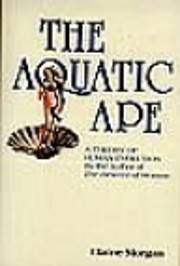

Cliquer sur une vignette pour aller sur Google Books.
|
Chargement... Des origines aquatiques de l'homme (Une théorie de l'évolution humaine)par Elaine Morgan

Aucun Actuellement, il n'y a pas de discussions au sujet de ce livre. In fact, it is not true that human beings would not acquire the art of swimming unless they were taught. Anthony Storr describes the experience of one group of doctors in London: 'The pioneer doctors who started the Peckham Health Centre discovered that quite tiny children could be safely left in the sloping shallow end of a swimming bath. Provided no adult interfered with them they would teach themselves to swim, exploring the water gradually and never venturing beyond the point at which they began to feel unsafe.' I have just re-read this book about the aquatic ape hypothesis, which states that a lot of the differences between humans and the other great apes can be explained by one of our ancestors spending time in an aquatic environment, but returning to the land before becoming adapted to the water as much as seals are. The author wrote another book on the same subject later, so if you are interested it would probably be better to read "The Aquatic Ape Hypothesis" as the information in it will be more up to date. That's why I am only giving it three stars, since it is certainly interesting enough to be worth 4 stars. aucune critique | ajouter une critique
Aucune description trouvée dans une bibliothèque |
Discussion en coursAucunCouvertures populaires
 Google Books — Chargement... Google Books — Chargement...GenresClassification décimale de Melvil (CDD)573.2Natural sciences and mathematics Life Sciences, Biology Physiological systems in animals Origin of manClassification de la Bibliothèque du CongrèsÉvaluationMoyenne: (2.75) (2.75)
Est-ce vous ?Devenez un(e) auteur LibraryThing. |
|||||||||||||||||||||||||||||||||||||||||||||||||||||||||||||||||||||||||||||||||||||||||||||||||||||||||
The author makes use of discoveries since her original book, such as the beginning of protein analysis, a precursor of DNA sequencing. This puts the splitting off of hominids from the line that led to the gorilla and chimpanzee as being much more recent than originally thought, therefore reducing the long interval in which the purported move to water and back again (before anything drastic could happen such as losing our legs along the lines of seals, dolphins etc), could take place. That didn't appear to faze her however.
The end of the book is disorganised and peters out. Not only are there appendices which include, among other things, Hardy's original article setting forth his theory and his follow- ups - which reveal that he didn't go the whole hog but rather suggested that our hominid ancestors spent about 5 hours a day in water - but the final chapter is a reprint of a paper by a man from the Washington Naval Research Laboratory who made an investigation into whereabouts the suggested aquatic migration could have taken place. The penultimate chapter doesn't reach any conclusion or warn the reader that the author's input has ended. As as a reader I was expecting a conclusion after La Lumiere's research, which would be more appropriately included as an appendix. So the book came to a limping halt for me.
The style in which it is written is much more academic in tone with none of the jokey or pithy remarks of 'The Descent of Woman' and comes across as a bit dry. Altogether, I would award this an OK 2 stars. (